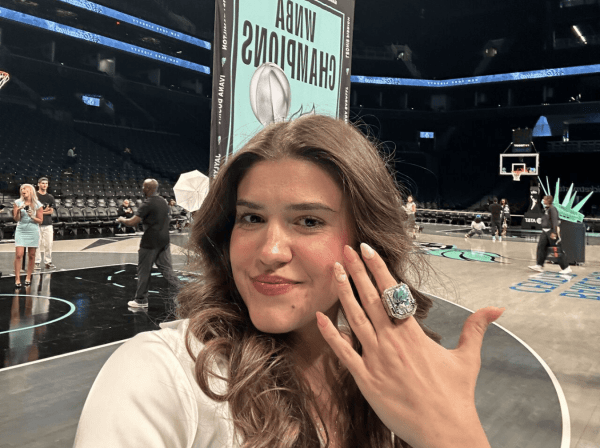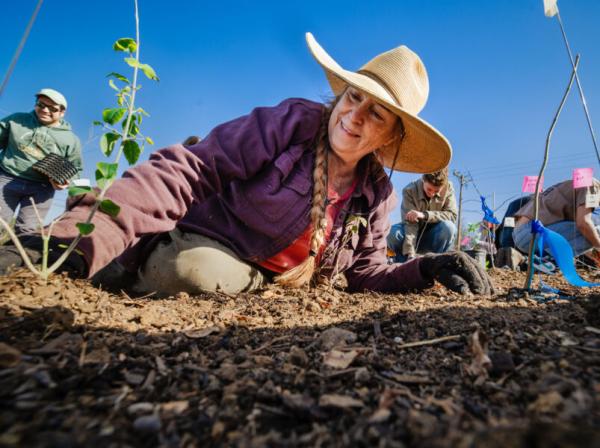McNair Scholars Find a Path to Graduate School
Graduate school can seem intimidating — especially if you’re the first person in your family to attend college.
That’s why the McNair Scholars Program exists: to help students who are low-income and first generation, or who come from underrepresented backgrounds, prepare to earn a PhD. With that degree, they can pursue careers in research or teach at the college level. During the school year, McNair Scholars learn how to apply to graduate school and find funding. Over the summer, they conduct independent research and present their findings to an audience of students and professors.
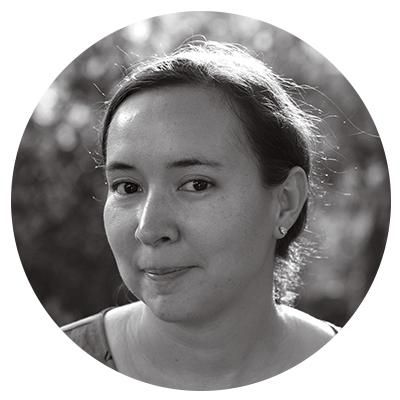
Victoria Rodriguez ’11, Psychology
Victoria Rodriguez ’11 conducted research on racial and ethnic identify as a McNair Scholar at St. Edward’s. After graduating from St. Edward’s, she earned her doctorate in Developmental and Psychological Sciences at Stanford Graduate School of Education. Currently, she’s a postdoctoral fellow at the University of San Diego and McNair research mentor. “My McNair experience is the reason I went to graduate school and part of the reason I was able to make it through,” Rodriguez says. “So this was me trying to give back the best way I knew how.” Read more about Rodriguez’s remarkable journey to achieving her dream of a PhD.
Three current McNair Scholars told us about the research projects they’re working on this year and how the program has helped them grow.
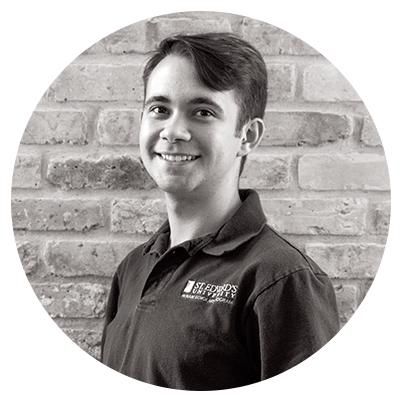
Anthony Sanchez ’19, Biochemistry
My goal has always been to do pharmaceutical research, but I didn’t have a road map to get there. The McNair program has helped me figure it out. I’ve been able to narrow down my interests, and then learn how to articulate them in an application for graduate school. The research opportunities and the exposure to other presenters and scientists at conferences helped me understand what I really want to do.
My first summer, I worked on a synthetic chemistry project with Assistant Professor of Chemistry Santiago Toledo Carrion. This past summer, I worked on a biochemistry project with Professor of Biological Sciences Andrea Holgado, in which we used roundworms to study the effects of mutations associated with neurodegenerative diseases, like Alzheimer’s and ALS, on key chemical pathways. In the fall, we examined the effects of a drug on restoring the function of those pathways. We use roundworms as a model organism because they have similar nervous systems to humans.
Because of these research projects I’ve learned how to write a literature review, which has made a huge difference in my confidence. Last summer, when I started reading the chemistry papers, I didn’t understand any of them. But the more I read, the more I grew accustomed to it and familiar with the vocabulary. By the time I finished, my manuscript was close to 30 pages long, and I had a good understanding of the material.
I presented my research at a McNair conference at the University at Buffalo, where I got to network with people from graduate programs. I also went to Niagara Falls! So not only is McNair preparing me for graduate school, but it’s also giving me life experiences that I wouldn’t have otherwise. Plus, the GRE prep course — which I wouldn’t have been able to afford on my own — helped me significantly improve my score.
In McNair, your cohort becomes your family. It’s hard to feel alone in McNair, and some of my best friends are fellow McNair Scholars I met through the program.
McNair has helped me a lot with confidence, with direction, and with avoiding impostor syndrome. I think that when I get to graduate school, I’ll feel like I belong: that I have the skills I need, that I’m prepared, that I deserve to be there.
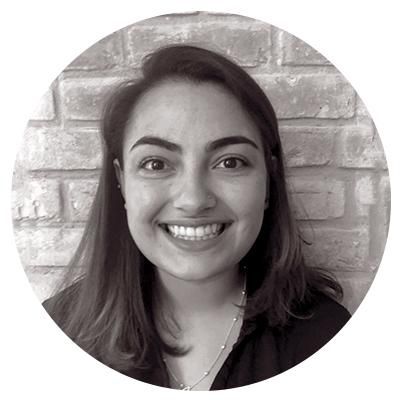
Chantal Neutzler ’19, Biology
I came to St. Edward’s with prior knowledge of the McNair program because my older sister was a McNair Scholar here. Her involvement allowed her to participate in research that led her to graduate school. She now works as an engineer for NASA. I applied to McNair because I was also interested in research and in exploring the possibilities of a career in neuroscience. I’m looking into PhD programs and can see myself either working in academia or industry.
I began my research experience at St. Edward’s before I became part of McNair. During the second semester of my freshman year, Associate Professor of Behavioral Neuroscience Jessica Boyette-Davis (whose General Psychology class I had taken) allowed me to help out in her research lab. My job was limited to filling up ice buckets at 7 am for morning sessions with test subjects, but I was excited to get my foot in the door.
My sophomore year, Dr. Boyette-Davis put me on a project as a data collector for a senior’s research thesis. She was studying cytokine expression in response to stress, and I collected saliva samples in the lab from people whom we put under stress. Part of my job was administering unusual quizzes to participants and telling them we were recording and reporting their performance. In reality, we were just trying to induce stress and take “before” and “after” saliva samples.
In the summer of 2017, I began working with the model organism nematodes. Associate Professor of Biology Fidelma O’Leary and I are studying the process of autophagy — an organism’s waste-removal system — in the roundworm C. elegans. We are examining the behaviors and health of worms that are genetically modified to have a higher amyloid beta plaque — similar to a brain with Alzheimer’s disease — when they are cultivated in an environment with rapamycin, a drug that has been reported to induce autophagy.
With the support of the McNair program, I’ve been able to present my work around the country. These experiences have helped improve my public speaking skills and interact with professionals in the STEM field. I’ve presented at the University of California, Berkeley; at The University of Texas at Austin; and at the 2017 Society for Neuroscience conference in Washington, D.C. The people I’ve met and conversations I’ve had have solidified my interest in neuroscience.
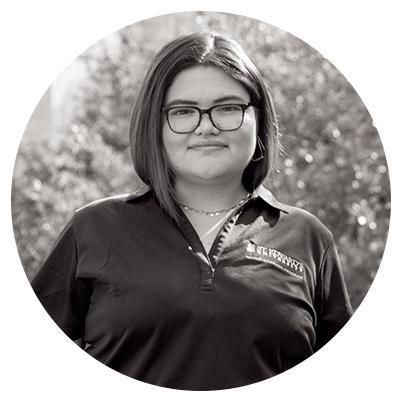
Nubia Briones ’18, Psychology
When I was growing up, my parents traveled around the country as migrant farmworkers, picking strawberries, tomatoes, asparagus and watermelon. My dad always pushed us to do better in school so we’d have other options, and I came to St. Edward’s through the College Assistance Migrant Program.
My brother was the first in our family to go to school in the U.S. For him it was hard to know what questions he needed to ask to find out about opportunities like scholarships. Because of his experience, I knew how to navigate college — but I’d always wanted to get an advanced degree, and I didn’t know anything about that process. So I applied to McNair. Through the McNair program I’ve learned what graduate schools expect from student researchers, and what career options are available afterward.
I’ve been interested in ethnicity ever since I took Social Psychology. A few years ago, during the European refugee crisis, many news outlets published a photo of a 3-year-old Syrian boy who drowned in the Mediterranean Sea when the boat he was on capsized. Some people were horrified and wanted to help refugees, but other people said, Well, migrants shouldn’t be trying to illegally get somewhere else. They couldn’t empathize with the Syrian child. I became interested in what impact a person’s ethnicity has on their ability to empathize with people of different races.
Last summer I did research about ethnocultural empathy, which is people’s ability to empathize with people from a different race or ethnicity. My research this summer continues the same theme, but I’m looking at whether ethnic identity — or how strongly you identify with your ethnic group — influences your ability to empathize with people from other backgrounds. I’ve presented my research on campus and at McNair conferences in Oklahoma, Kansas and Buffalo, N.Y. Every time, the overwhelming response I get is that my research is very relevant to current events.
I want to earn a PhD in counseling or social psychology and become a professor. I want to establish a nonprofit in the Rio Grande Valley, where I’m from, that provides therapy for low-income children and adolescents. And I would love to write books: I can imagine someone sitting in an Intro to Psychology class, reading a chapter I wrote.
McNair at St. Edward’s: 15 Years of Accomplishments
1999: St. Edward’s joins a McNair Scholars Program partnership with the University of Notre Dame. Twenty-five students from St. Edward’s are coached through the graduate school application process, and an average of five conduct research at Notre Dame over the summer.
2003: St. Edward’s wins its own McNair grant, allowing it to support 29 students in graduate school preparation and a summer research experience.
2012: The first McNair Scholar from St. Edward’s earns a PhD. Dahlia Campbell, who earned a PhD in Chemistry from Purdue University, now works as a chemist at the company BASF.
2018: To date, the program has graduated 13 PhDs, three doctors of Physical Therapy, one doctor of Veterinary Medicine and two doctors of Pharmacy. Another 20 students are currently enrolled in PhD programs, and nearly 70 have earned master’s degrees.

